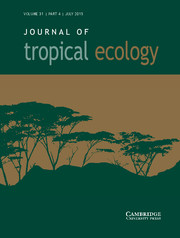Crossref Citations
This article has been cited by the following publications. This list is generated based on data provided by
Crossref.
Davey, Marie L.
Heegaard, Einar
Halvorsen, Rune
Ohlson, Mikael
and
Kauserud, Håvard
2012.
Seasonal trends in the biomass and structure of bryophyte‐associated fungal communities explored by 454 pyrosequencing.
New Phytologist,
Vol. 195,
Issue. 4,
p.
844.
Ferreira, Verónica
Encalada, Andrea C.
and
Graça, Manuel A. S.
2012.
Effects of litter diversity on decomposition and biological colonization of submerged litter in temperate and tropical streams.
Freshwater Science,
Vol. 31,
Issue. 3,
p.
945.
Fuell, Allyn K.
Entrekin, Sally A.
Owen, G. Scott
and
Owen, Sara K.
2013.
Drivers of Leaf Decomposition in Two Wetland Types in the Arkansas River Valley, U.S.A..
Wetlands,
Vol. 33,
Issue. 6,
p.
1127.
Lähteenoja, Outi
Flores, Bernardo
and
Nelson, Bruce
2013.
Tropical Peat Accumulation in Central Amazonia.
Wetlands,
Vol. 33,
Issue. 3,
p.
495.
Kirwan, M. L.
Langley, J. A.
Guntenspergen, G. R.
and
Megonigal, J. P.
2013.
The impact of sea-level rise on organic matter decay rates in Chesapeake Bay brackish tidal marshes.
Biogeosciences,
Vol. 10,
Issue. 3,
p.
1869.
dos Santos, Aline Ramos
and
Nelson, Bruce Walker
2013.
Leaf decomposition and fine fuels in floodplain forests of the Rio Negro in the Brazilian Amazon.
Journal of Tropical Ecology,
Vol. 29,
Issue. 5,
p.
455.
Capps, Krista A.
Rancatti, Regina
Tomczyk, Nathan
Parr, Thomas B.
Calhoun, Aram J. K.
and
Hunter, Malcolm
2014.
Biogeochemical Hotspots in Forested Landscapes: The Role of Vernal Pools in Denitrification and Organic Matter Processing.
Ecosystems,
Vol. 17,
Issue. 8,
p.
1455.
Santos, Iris Gabrielly Arruda dos
and
Rodrigues, Gilberto Gonçalves
2015.
Colonização de macroinvertebrados bentônicos em detritos foliares em um riacho de primeira ordem na Floresta Atlântica do nordeste brasileiro.
Iheringia. Série Zoologia,
Vol. 105,
Issue. 1,
p.
84.
Graça, Manuel A. S.
Ferreira, Verónica
Canhoto, Cristina
Encalada, Andrea C.
Guerrero‐Bolaño, Francisco
Wantzen, Karl M.
and
Boyero, Luz
2015.
A conceptual model of litter breakdown in low order streams.
International Review of Hydrobiology,
Vol. 100,
Issue. 1,
p.
1.
Buscardo, Erika
Nardoto, Gabriela
Luizão, Flávio
Piedade, Maria T. F.
Schöngart, Jochen
Wittmann, Florian
Doughty, Christopher E.
Quesada, Carlos A.
and
Nagy, Laszlo
2016.
Interactions Between Biosphere, Atmosphere and Human Land Use in the Amazon Basin.
Vol. 227,
Issue. ,
p.
225.
Graça, Manuel A.S.
Hyde, Kevin
and
Chauvet, Eric
2016.
Aquatic hyphomycetes and litter decomposition in tropical – subtropical low order streams.
Fungal Ecology,
Vol. 19,
Issue. ,
p.
182.
de Souza Rezende, Renan
S. Graça, Manuel A.
dos Santos, Anderson M.
Medeiros, Adriana O.
Santos, Paola F.
Nunes, Yule R.
and
Gonçalves Júnior, José F.
2016.
Organic Matter Dynamics in a Tropical Gallery Forest in a Grassland Landscape.
Biotropica,
Vol. 48,
Issue. 3,
p.
301.
Northington, Robert M.
and
Webster, Jackson R.
2017.
Experimental reductions in stream flow alter litter processing and consumer subsidies in headwater streams.
Freshwater Biology,
Vol. 62,
Issue. 4,
p.
737.
Likar, Matevž
Dolinar, Nataša
Vogel-Mikuš, Katarina
Gaberščik, Alenka
and
Regvar, Marjana
2018.
Elemental composition and fungal colonisation of decomposing Phragmites australis (Cav.) Trin. ex Steud. litter at different water regimes.
Acta Biologica Slovenica,
Vol. 61,
Issue. 2,
p.
71.
Xie, Yajun
Xie, Yonghong
Xiao, Huayun
Chen, Xinsheng
and
Li, Feng
2019.
The effects of simulated inundation duration and frequency on litter decomposition: A one-year experiment.
Limnologica,
Vol. 74,
Issue. ,
p.
8.
Rezende, Renan de Souza
Albuquerque, Cristiano Queiroz de
Hirota, Andrezza Sayuri Victoriano
Silva, Paulo Fernandes Roges Souza
Umetsu, Ricardo Keichi
Cabette, Helena Soares Ramos
Bambi, Paulino
Guedes, Natália
Lima-Rezende, Cássia Alves
and
Gonçalves-Júnior, José Francisco
2019.
Post-fire consequences for leaf breakdown in a tropical stream.
Acta Limnologica Brasiliensia,
Vol. 31,
Issue. ,
Four, B.
Cárdenas, R. E.
and
Dangles, O.
2019.
Traits or habitat? Disentangling predictors of leaf‐litter decomposition in Amazonian soils and streams.
Ecosphere,
Vol. 10,
Issue. 4,
Ganong, Carissa
Hidalgo Oconitrillo, Minor
and
Pringle, Catherine
2021.
Thresholds of acidification impacts on macroinvertebrates adapted to seasonally acidified tropical streams: potential responses to extreme drought-driven pH declines.
PeerJ,
Vol. 9,
Issue. ,
p.
e11955.
Chen, Zhangting
Arif, Muhammad
Wang, Chaoying
Chen, Xuemei
and
Li, Changxiao
2021.
Effects of Hydrological Regime on Foliar Decomposition and Nutrient Release in the Riparian Zone of the Three Gorges Reservoir, China.
Frontiers in Plant Science,
Vol. 12,
Issue. ,
Martins, Renato Tavares
de Freitas Silva, Rafael Augusto Pinheiro
Pinto, Valéria Araújo Braule
Medeiros, Adriana Oliveira
Brito, Laisa
and
Hamada, Neusa
2022.
Effect of the microbial conditioning and temperature increase on the leaf consumption by shredders in Amazonian aquatic systems.
Hydrobiologia,
Vol. 849,
Issue. 16,
p.
3531.

